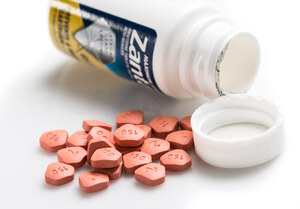
From blockbuster to busted
Introduced in 1983, Zantac is often hailed as the pharmaceutical industry’s first hugely successful blockbuster pill. Heavy promotion certainly contributed to the money it made for its manufacturer, Glaxo. In 1989, Zantac was described as the best selling prescription drug in the world.
The active ingredient, ranitidine, is a histamine-2 blocker, which decreases the amount of acid created by the stomach. Prescription ranitidine was approved by the FDA in the early 1980s for multiple conditions, including treatment and prevention of stomach and intestinal ulcers and treatment of gastroesophageal reflux disease.
Zantac’s fall from favor was gradual at first, but by 2019, the bottom had begun to fall out. The problems increasingly appear to have stemmed, not from the formulation of the drug , contamination, or the potential for misuse, but from its chemical instability, especially when exposed to increases in temperature during storage. The culprit is cancer-causing N-Nitrosodimethylamine, or NDMA.
NDMA is a chemical commonly present in the environment in small amounts. But by late 2019 reports began to surface that Zantac appeared to produce unacceptably high levels of NDMA when exposed to heat for as little as five days. These included minor temperature fluctuations that could easily occur either in transit or in a consumer’s home. Higher levels of NDMA exposure have been linked to cancers of the kidneys, colon, breast, prostate, thyroid and bladder.
Cancer, in the abstract, tends to be someone else’s problem. But the Zantac cancer lawsuits tell a grittier story of people and families facing disease. Even people who survive bladder cancer, for instance, may face a lifelong regime of chemotherapy, immunotherapy and other treatments to keep the cancer in check. Living with cancer that does not go away can be difficult and stressful – not just for the survivor, but for those who struggle to support them.
Pharmacy tests raise early alerts
The information came, not from the manufacturer or from government regulatory agencies, but from independent pharmaceutical laboratories that had taken on the task of testing drugs distributed and sold in their stores.
In September 2019, Valisure, an online pharmacy based in Connecticut, informed the FDA that it had found NDMA in some batches of Zantac and its generic, ranitidine. In the same month, CVS Pharmacy announced that it would suspend sales of all Zantac-brand and CVS Health-brand ranitidine products until further notice, pending the results of an FDA investigation.
On January 6, Northwind Pharmaceuticals voluntarily recalled all unexpired lots of ranitidine tablets. It halted distribution of its ranitidine products throughout the United States. On January 7, Appco Pharma followed suit and recalled all unexpired ranitidine hydrochloride capsules 150 mg and 300 mg. On January 8, Mylan Pharmaceuticals announced a voluntary nationwide recall of nizatidine capsules USP, an antacid similar to rantidine and also used to treat ulcers, esophagitis and acid reflux because of trace amounts of NDMA found in the product.
The FDA, nonetheless, continued to slowly study the problem and apparently limited its efforts to asking manufacturers to voluntarily expand their testing. Now, the other shoe has finally dropped.
Forecast for Zantac cancer lawsuits
READ MORE ZANTAC HEARTBURN MEDICATION LEGAL NEWS
These lawsuits are usually framed as “failure to warn” cases that depend on an argument that the manufacturer (and perhaps the distributor and/or retailer) knew or had reason to know that the drug was dangerous to patients. Yet, as the argument might proceed, those in the know failed to warn people who could be harmed, so that they could take appropriate steps or seek other treatments.
The evidentiary issues will cluster around the problem of proving actual or constructive knowledge. If the lawsuits proceed, rather than being settled out quickly, that is where the questions will arise. If anything, the news from the FDA may increase the likelihood of quick settlement offers.
